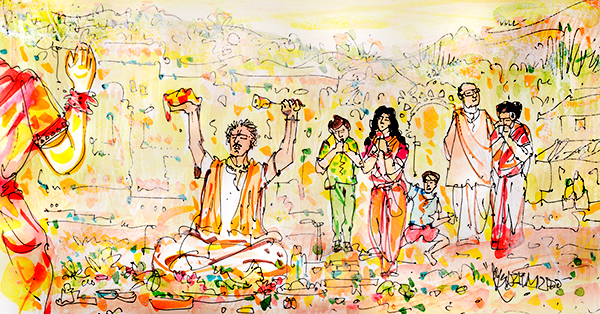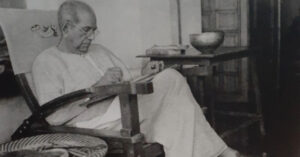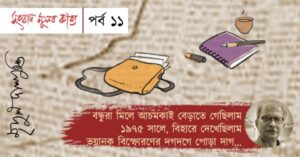The Stolen Priest of Lokkhi Pujo
Before the world became as overpopulated as it is now, and there were fewer people and fewer gods – certainly fewer pujo pandals – the people of Siliguri waited for two days of the year: Lokkhi pujo and Saraswati pujo. Swastika, Jatiya Yuva Sangha, JTS and GTS, Deshbandhu Sporting, Hyderpara Club, there were only a few well-known Durga pujo and Kali pujo pandals one went to then, pushed into crowds, children like us squashed between adults, our arms getting entangled in saris and bags and long plaits, our noses filled with a mix of cheap perfumes, mostly fake Charlie and Old Spice bought from Hong Kong Market. Over these our little bodies and little desires had no control. Adults decided itineraries and menus – of what would be eaten on which day and when the family would walk towards which half of the town to look at the pandals. These were the grandest events of the calendar – this, too, the adults had decided.
It was the two sisters and their birthdays – for that alone was how we thought of pujas at that time, the ‘special day’ of the gods and goddesses – for which we waited. In them, in the rituals and celebrations, but mostly in our enthusiasm to be an apprentice to the adult world waiting for us, we were real participants. The pujo pandals were created by neighbourhood clubs, who, in turn, collected money from residents of the area. We were observers in these spaces, allowed to move in and out through Entry and Exit signs – the flowers we threw at the goddess’s feet from three rows behind the priest often landed on the heads of aunts and grandmothers. All this is to only say how distant we were from the pujos in the pandals.
On Lokkhi pujo and Saraswati pujo, though, we were both leaders and cheerleaders. Waking up early in the morning, collecting flowers and dubbo ghash from homes and front yards of neighbours, stealing flowers from gardens of strangers occasionally, doing all of this noisily, almost to draw attention to ourselves, not to others but to ourselves, to convince ourselves of our importance.
On Lokkhi pujo and Saraswati pujo, though, we were both leaders and cheerleaders. Waking up early in the morning, collecting flowers and dubbo ghash from homes and front yards of neighbours, stealing flowers from gardens of strangers occasionally, doing all of this noisily, almost to draw attention to ourselves, not to others but to ourselves, to convince ourselves of our importance. A quick bath, helping with arranging the flowers and leaves, peeling and cutting fruits, filling urns and bowls with water, running to the uthon for a few tulsi leaves, calling out to Bappa or Buri-didi for a little ghee or honey that Baba or Ma has forgotten to buy from Dashakarma Bhandar in Bidhan Market (for there were only two or three such shops in this small town then), shelling peas if a handful had been bought for a steep price, making sandalwood paste – and yet, none of this was real work.
The real task lay ahead. As the fragrance of nunia atap rice – in payesh and khichuri – began to grow with the day, indulging our appetite and impatience, we began to move out of our houses on to the street. All of us were children – an army that derived its power from being children. We were now trained in this, even though we got riyaz for this only twice a year, on the days of Lokkhi pujo and Saraswati pujo. The thakurmashai, the priest, had promised to come at 9 am, but it would soon be noon. When would the pujo take place, and when would we eat the bhog, the luchi and payesh, the papad bhaja and tomato chutney?
It was actually the fathers and uncles who had set us on this route. At some point of time in the day – usually late morning – a priest would pass by our house. Usually a thin man on a secondhand Hero bicycle, he would try to cycle to his destination with more speed than his body – kept starving because the pujo that he would have to perform – would allow. One of us was responsible for the sighting. As soon as he had entered the mouth of our lane, Bappa and Sanjay, Rohit and Buri didi, Papai and Iti, Debu and Alok, and my brother and I would form a human chain in front of our house. The priest would ring the cycle bell fiercely, shout at us in anger, then plead with us (‘They are waiting for us …’), but we wouldn’t relent. Soon his bicycle would be in our compound, and he’d be chanting the mantras, first in our house, then in Bappa’s, then the next and the next …
When I’d grow up, I’d learn that if one stole something on Lokkhi Purnima night, one could keep it. I think of Siliguri in the 1980s and 90s and think of the priest we stole on Lokkhi and Saraswati pujo every year.
That town has disappeared.
Now the priest arrives on time, he speaks to those waiting for him on the cell phone. He rides a motorbike.
We would not have been able to stop a motorbike.
Illustration by Suvamoy Mitra






